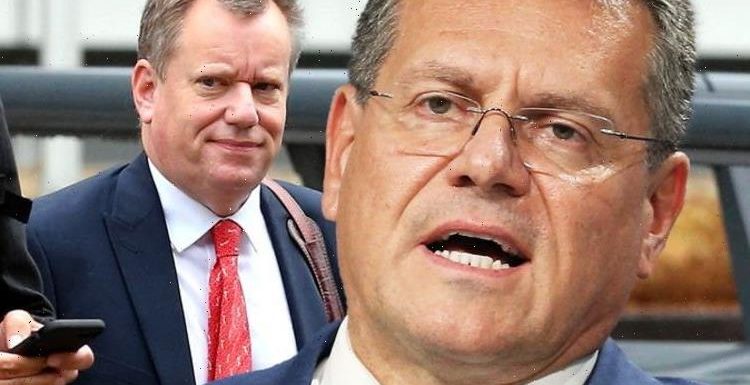
Lord Frost gives update on UK’s participation in Horizon Europe
We use your sign-up to provide content in ways you’ve consented to and to improve our understanding of you. This may include adverts from us and 3rd parties based on our understanding. You can unsubscribe at any time. More info
Britain had originally been denied access to Horizon Europe until it resolves Brexit disputes over the Northern Ireland Protocol and fishing licenses. But the UK was supposed to be a member of the nearly £80billion programme as part of the Brexit deal. EU sources have reportedly blamed the delay in letting Britain join on the UK’s threats to unilaterally override the protocol by triggering Article 16.
Brussels claims this move would break the treaty and international law.
A European Commission spokesman told The Telegraph: “The UK’s association to Horizon Europe and other EU programmes will be finalised in due course.
“This requires a level of trust that the attached conditions will be complied with.”
This comes as Brexit Minister Lord David Frost and European Commission Vice President Maros Sefcovic meet today for more Brexit talks.
The Commission ramped up the pressure on Britain in the post-Brexit dispute by setting a December 10 deadline to resolve the fishing licenses issue.
But Lord Frost has claimed that it is the EU that has been betraying the Brexit deal is threatening to trigger Article 16 over the dispute.


Mr Sefcovic has warned that this would have “serious consequences”.
Professor James Wilsdon, from the University of Sheffield, told Express.co.uk that this move would see Britain permanently excluded from Horizon Europe.
He said: “If Article 16 is invoked, I would think that it would take our association with the project off the table entirely.”
Lord Frost has said that the Trade and Cooperation Agreement (TCA) that was included as part of the Brexit deal has not been violated by Britain.
This, Lord Frost claims, means that there should not have been a delay in letting Britain participate in Horizon Europe.
He told the House of Lords last month: “We agreed we would participate in this in the TCA and we agreed to pay a contribution of £15billion over seven years.
“The TCA is clear, the UK shall participate, and the relevant protocol shall be adopted, that is an obligation.”

Senior Government sources have accused the EU of “going slow” to get leverage in talks over the protocol, which created the Irish Sea border.
They argue that the process of formalising membership should have started back in May.
And the science community has echoed that Government’s frustration.
A document signed, by the European Health Stakeholder Group involving a score of health companies, demanding that the EU let the UK formally participate in Horizon Europe “as soon as possible”.
It reads: “We have all reaped the mutual health benefits of these collaborations.
“Together, we have significantly advanced health care across Europe, saving and improving citizens’ lives.
“We stand with our colleagues in the EU’s research and innovation community in urging the European Commission to formalise the UK’s association to Horizon Europe without further delay.”
DON’T MISS
MIT scientist claims Earth is on the brink of a mass extinction [REVEAL]
Stonehenge breakthrough after ‘amazing discovery’ in Israel [REPORT]
Russia could deliver hammer blow to UK economy [INSIGHT]

They were not alone in their calls.
Up to 25 groups representing Europe’s academic and research sector also wrote to the European Commission president Ursula von der Leyen, demanding that the UK should be allowed to re-join.
The letter was signed by more than 1,000 universities and thousands of European researchers.
And now, as Britain still waits for membership, even non-EU countries including Georgia, Israel, Bosnia and Herzegovina, Kosovo, Montenegro, North Macedonia and Serbia were all granted associate membership of Horizon Europe on Tuesday.

The UK was supposed to contribute £15 billion to the seven-year programme, £2.1 billion each year, so British scientists and researchers could have access to the large pool of European funding that comes with the formal association.
The longer Britain waits, the more damaging for British science it is, the research community have argued.
The Government is reportedly planning to walk away from Horizon Europe and go it alone in early 2022, unless membership gets granted soon.
Source: Read Full Article